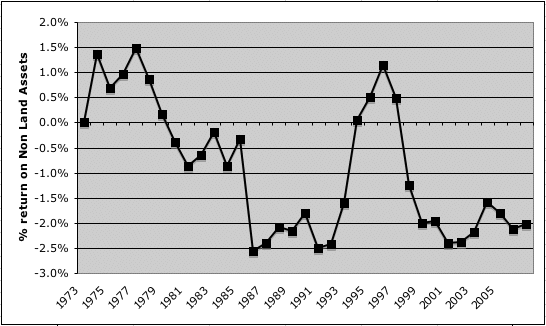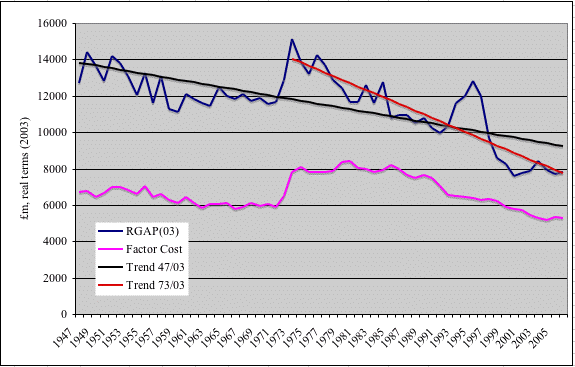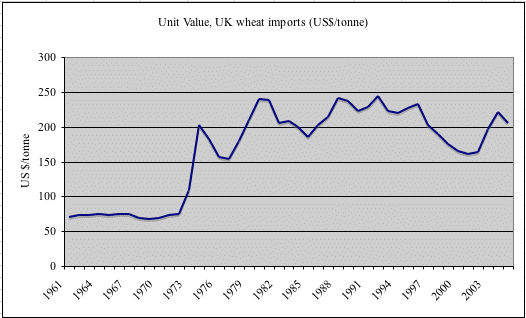So, what happens next?
- Livestock prices have to go up
as well, since both the costs of feed have gone up - (animals
will not be fed at a loss indefinitely, some farmers will stop feedng
and the price of livestock and livestock products will go up); and the
opportunity cost of feding livestock rather than growing (high priced)
grain has gone up as well, so livestock production is less attractive
and is reduced, driving up the price of livestock
- Just to prove Murphy's Law - in the early 1970s, the Peruvian anchovy shoals suddenly
moved (due to the El Nino shifting) and the anchovy catch fell,
increasing the price of protein
feeds, and exacerbating the commodity price boom
- The UK (Tory, under Heath) government's response to the oil
crisis (and the coincidental miners' strike and a government imposed 3
day week in late 1973 to conserve fuel stocks) was a 'dash for growth':
- increase
government spending, without increasing interest rates or government
borrowing (some basic Economics needed here ) -> does what?
- increases the circular
flow of income - increasing incomes
(perhaps), but also:
- precipitates a balance of
payments crisis on the ForEx account, as imports rise (already
up becuase of high oil and commodity prices), and reduces capital
inflows,
- which, in a world of floating exchange rates, leads to a depreciation of the currency
(£), making imports more expensive, worsening the BoP deficit in
the short term, and exacerbating the depreciation,
- reduces interest rates, and increases asset prices (why?) -
macroeconomics and financial markets again.
- So? INFLATION - up
to 25% in 1974 in the UK, against interest rates of 10% or so
- So - what do farmers do? High prices = good times - increase production, and increase capital investment, and try to buy land, if necessary with borrowed money
(it's dirt cheap, after all - so long as the prices stay high, which
they are bound to, aren't they - they were caused by our entry to the
EU and adoption of the CAP
- Result? Machinery
and capital plant prices increase, land prices and rents go up, Fixed
costs (Factor costs) increase - as seen above. Increased returns lead
to increased costs, and limited to (in the end) no real increase in
farm incomes. As farmers compete with each other to expand and increase
production in response to higher prices, so they bid up the prices of
inputs and resources (land, labour and capital), so exhausting the
incentive to produce more and returning the earnings of people engaged
in the industry to their equilibrium level - the amounts they could
earn doing something else.
- BUT - Commodity prices
did not remain high. High grain stocks disappeared, production
around the world increased, and the USSR's harvests returned to more
normal levels, so commodity prices fell. In fact, the EU's CAP
prevented the full effects of the commodity price boom from affecting
farmers in the EU 6 (Germany, France, Italy, Belgium, Luxembourg,
Netherlands), since the export subsidies became export taxes as world
prices exceeded EU intervention prices.
- British Farming took some time to get over the consequences of
the 1970s exuberance, which left it in a rather uncompetitive (high
cost) state.
Business Perfomance of British Agriculture:
Total Income from Farming, as the gap between fixed costs (as actually
paid to creditors, landlords, hired labour, and set aside for
depreciation) and gross value added, has clearly come under
considerable pressure since
1973: see first graph above. However, perhaps this decline in the
aggregate value of the
industry's Income exagerates the extent to which individual farm
businesses have been under pressure. If there are fewer farmers,
then a decline in the aggregate income need not mean a decline in
individual business income. Perhaps enough people have left agriculture
that it is now in a healthy state?
If we suppose that the family and own labour employed in Agriculture,
according to the national statistics, all earn the same unit wage rate
as the hired labour earns (as a crude approximation to the opportunity
cost of family and own labour), and if we also assume that all
agricultural land earns the same average rent as that paid for actually
tenanted land (as a reasonable approximation to the opportunity cost of
land), and deduct these opportunity costs from the gross value added,
as well as interest, depreciation and hired labour, then the balance
represents a return to the capital assets (other than land) employed in
agriculture. What does this business return look like?
The following figure (derived from the
Defra
statistics) shows the picture, with the return expressed as a % of
the value of the total assets.
British
Agriculture's Business Perfomance, 1973 - 2006.

As can be seen, British Farming only
earned a postive return on its own capital between 1973 and 1979, and
then again between 1994 and 1997 (Why then?) - Otherwise, it has been
working for nothing, or for love.
This is not really a picture of steady or trend decline, but it is a
picture
of poor performance, with occassional relief during (as it turns out)
strong markets - either due to world market conditions (1970s) or to
the translation of these market forces through a favourable exchange
rate (1990s). Otherwise, policy seems to have had very little effect.
One could argue that conditions and perfomance would have been much
worse without the policy - but the counter-argument is that British
Agriculture would have adjusted and adapted to conditions without
support to generate at least as good a perfomance as this.
What evidence is there for this assertion? We can look at the
New
Zealand experience.
Back
to Index



